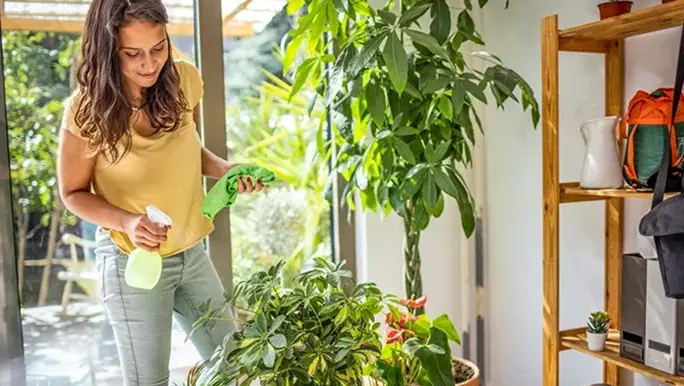Health benefits of indoor plants

Key points:
- Love your monsteras and fiddle leaf figs? We have some good news for you.
- Houseplants may help to improve our mental and physical wellbeing.
- We take a look at the science-backed health benefits of indoor plants.
Step into a home with luscious leafy houseplants and chances are you’ll feel instant zen vibes. Why? Research shows that bringing nature into our own space has benefits to our overall health and wellbeing.
While there’s no denying our leafy friends can make a space more beautiful (who doesn’t know someone with a statement fiddle leaf fig plant?), we look into some pretty fascinating science-backed benefits of indoor plants, starting with how they can help you feel less stressed.
They may reduce stress levels
In a 2015 study, researchers asked participants to repot a houseplant or complete a short computer-based task. They found that the indoor gardening task significantly reduced participants’ blood pressure versus working on the computer, with participants reporting feeling comfortable and soothed after caring for the plants. The researchers suggest that the stress-reducing effect of plants may be the result of multiple natural stimuli acting on the senses of vision, hearing, touch and smell.
Even just looking at plants has been shown to have a positive impact on stress levels. A 2002 research review found that several studies of people in hospital settings have consistently shown that looking at environments dominated by nature (compared to built scenes lacking in nature) had significant stress-reducing effects. However, it’s important to note the focus of the review was research on plants and natural scenery in hospital settings rather than in the home.
Increased happiness
Can you relate to feeling happier since being a plant parent? Research suggests that nature has a restorative effect on us, simply by viewing vegetation or greenery; it may elevate levels of positive feelings and reduce negatively toned emotions, such as fear, anger and sadness.
A 2019 research review found that exposure to indoor plants improved feelings of wellbeing. The researchers explained that plants can help to boost levels of comfort and positive emotions and reduce negative feelings. In fact, they noted that purple and green plants were particularly effective at reducing negative feelings. This might explain the popularity of indoor plants and indoor gardening during the covid pandemic!
Being more connected with nature is also linked to greater life satisfaction and vitality (feeling alive, alert and energetic).
Enhanced attention and productivity
Think plants have no work-related function? Think again. A 2014 field experiment found that employees who had a view of plants completed a concentration test faster than employees in a room without a view of plants. Employees also experienced increased productivity when their office space included plants and reported higher workplace satisfaction.
For elementary students, a 2019 study showed that when in a classroom with a fake plant, a real plant, a photo of a plant, or no plant, those who spent time with the real plant improved their attention and concentration.
They may support mental health
Indoor gardening in patient settings has also been found to be helpful for people with mental health conditions. Known as horticultural therapy, where interacting with plants is used for treatment and rehabilitation, patients have described positive feelings of pride and a sense of achievement after gardening activities.
Other benefits reported from horticulture therapy include increases in self-esteem, confidence, life satisfaction, patience and delayed gratification. It’s worth mentioning that this type of therapy can involve both indoor and outdoor plant interactions.
They may help to improve indoor air quality
Ever heard of indoor plants acting as natural air purifiers? There may be some truth to this. The famous 1989 NASA “clean air study” concluded that the roots and soil of indoor plants reduced contaminants from the air, however, further research has both confirmed these findings and questioned them. Plus, this research was looking at the effects of using plants in small, sealed areas: space station conditions.
While the research is conflicting, there are several species shown to clean the air. Some of these include the areca and lady palm, Boston fern, English ivy, dwarf date palm, peace lily, and more. Apart from purifying the air by converting the carbon dioxide we exhale into fresh oxygen (aka photosynthesis), they can also remove toxins from the air by metabolising some toxic chemicals, as well as incorporating them into their plant tissues.
A handful of plants won’t cut it though. Research suggests that you would need multiple species of indoor plants to remove the relevant indoor contaminants, given that different species vary in the types of chemicals they are able to remove.
Asthma and allergy relief
Plants may both have a positive and negative effect on asthma. People with asthma have sensitive airways that can get inflamed with certain triggers, and may have an increased risk of developing other allergic conditions, such as hayfever.
According to Asthma Australia, the best plants for people with asthma and allergy will be the ones that don’t produce a lot of pollen, as a plant’s pollen or scent is often a trigger for asthma or repetitive sneezing. Allergy-friendly plants include devil’s ivy, heartleaf philodendron, snake plant, lucky bamboo and cacti.
Summary
Having indoor plants don’t just look nice, they help to improve our mental and physical wellbeing. They may reduce stress, improve mood, boost productivity, support mental wellbeing and more. There’s also some evidence that houseplants may improve indoor air quality, too. In short, bringing our leafy friends into your home or work space can transform it to a zen-like environment, making it a happier and healthier place to be.
Reviewed by healthylife health experts June 2023.
This article is for informational purposes only and does not provide medical advice, diagnosis, or treatment. Any information published on this website or by this brand is not intended as a substitute for medical advice. If you have any concerns or questions about your health you should consult with a health professional.